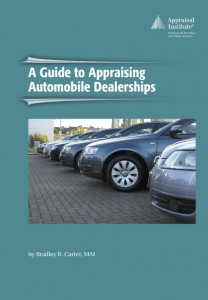An interview with Bradley Carter, MAI, CRE, CCIM, Greystone Valuation Services
Dealerships are unique entities where appraisal is concerned. They are going businesses whose value includes tangible assets such as real estate and more intangible factors such as Blue Sky.
Given their complicated nature, appraising even seemingly straightforward elements such as a dealership’s real estate has its own pitfalls.
The Appraisal Institute, the nation’s largest institute of real estate appraisers, has just published a book on valuing automobile dealership real estate, “A Guide to Appraising Automobile Dealerships.”
The book’s author, Automotive Buy Sell Report contributor Brad Carter, is a member of the Appraisal Institute and a partner at Greystone Evaluation Services.

Brad Carter
He spoke with us about the practice of appraising dealerships.
ABSR: How big a part of the real estate appraisal industry do dealerships represent?
Carter: They are a pretty thin slice. A lot of appraisers from time to time do dealerships. I appraise a lot of dealerships. At any time I am working on two to three dealership appraisals. I appraise other properties too.
ABSR: How active is the dealership portion of your business?
Carter: It is busier now than we were last year but not as busy as before the recession.
ABSR: How are dealership appraisals unique?
Carter: The facility upgrade requirements or reimaging requirements — that is a big issue [with dealerships]. Updating or renovating is not unique to auto dealerships but they are different because the manufacturer has so much leverage. [The manufacturer] lays out the time and the requirements but they are not the party that is paying for it. When someone else lays out the requirements and they aren’t doing it for the purpose of real estate profit that gets lost.
With an older dealership, the need for an upgrade is an important thing to look at. Typically an upgrade won’t produce a profit. The things that are required are for the benefit of the manufacturer don’t typically make the dealerships more functional from an operational standpoint or extend the economic life of the building.
ABSR: How do you assign a value to the upgrade requirement?
Carter: You look at other dealerships that have been sold that haven’t been upgraded and see what they were priced.
Here is a related point. A lot of appraisers will look at the sales at a dealership, if it is selling a lot of units they will take that to mean the dealership will probably remain open and remain operating at that location. But if the manufacturer comes to the dealer and requires a lot of renovation, the dealer may decide to close and build a new facility in a new location. If you are going to buy you may not care, but what if you are going to make a loan to a dealership? Then it would matter.
ABSR: One of the elements your book addresses is a dealership’s location. Every day I talk to someone, or read something, about online sales. How is the trend of online sales affecting the value of location?
Carter: Historically [location] has been the biggest component of any real estate valuation, but now because sales are moving online it is becoming less important. We used to look at unit sales and use that to guide us in the value of the location but today you can sell a lot of cars without a good location.
But location is still important. Having good access to traffic is still good even if you are a savvy internet marketer. It is still important to be near other dealerships in an Auto Mall or near other dealerships. You share traffic with your competitors.
ABSR: How does a dealership’s skill at Internet sales factor into an appraisal?
Carter: If they are just killing it on sales, and it is kind of a marginal location, we look at that and say there is a lot of value there but not necessarily real estate value. The entire value, including blue sky, will be high. [But] things are really good in the auto industry now. When things are good unconventional approaches can sometime work very well, whereas they might not in in a different environment.
We are going need to see the next downturn to really know if dealerships in marginal locations are doing as well [with strong internet sales]. Sometimes a downturn can be the determining factor of what makes sense in the long run.
ABSR: What changes have you seen in the dealership appraisal world in the last decade?
Carter: The only two changes I see are that data is more available now than it used to be, so there are lots of comparison sales, and the regulation on lenders have become a lot more stringent. [More regulation] affects the standards under which appraisals are developed. For example – in the past an appraiser could cite using judgement as the reason for a value. Today they would be expected to present data and reasoning.
ABSR: Your book examines highest and best use. What is that?
Carter: That is kind of a wonky term. It refers to the determination if a site is still viable as a new car dealership, and how long is that expected to last? If it is an older property and has antiquated look, maybe that is not the best use of the property. Maybe it is time to retire the property.
ABSR: What economic trends are having the most impact on appraisals now?
Carter: Right now as far as the auto industry goes it is a good economic environment. Dealers are out there looking for places they can sell vehicles [and] they are willing to pay for things and have money to do that. It is a good environment. Compare that to 2010. Then, the number of dealerships was contracting, dealers were having cash flow problems, and they were very careful at how they spent their money.
ABSR: Put on your futurist glasses. How will self-driving cars impact dealership value?
Carter: We try to measure [value] the way people in the market are measuring it when they make buy and sell decisions. An appraisal is an opinion of a specific date. If people aren’t so scared they aren’t paying less for something as of a specific date, it doesn’t enter into the appraisal. Right now this really isn’t the type of environment that encourages caution.
[But] if I were buying [a dealership] or considering lending to one, I think [self-driving cars] could really make a fundamental change in the demand for automotive dealership properties.
ABSR: What else would you like to tell our readers about your book?
Carter: Something many people don’t realize is how many appraisals are done incorrectly. One problem is that many appraisers don’t recognize that the sale of the property is only one part of a larger transaction. What we in the real estate business think of as the price of the real estate is just the value the buyer or seller is assigning to the real estate. That isn’t true of a dealership, it is part of a larger value that includes many other aspects of the dealership business.
For example, you buy a dealership and pay $10 million, and $8 million is assigned to real estate. So it is recorded as an $8 million real estate sale in the public record, but that is just $8 million out of a $10 million transaction. It could have just been assigned that value for tax purposes or some other reason. Always ask how the value was determined.
Brad Carter works at Greystone Valuation Services, a real estate appraisal and counseling firm. He can be reached at bcarter@greystonevs.com, or 678-904-9822.











